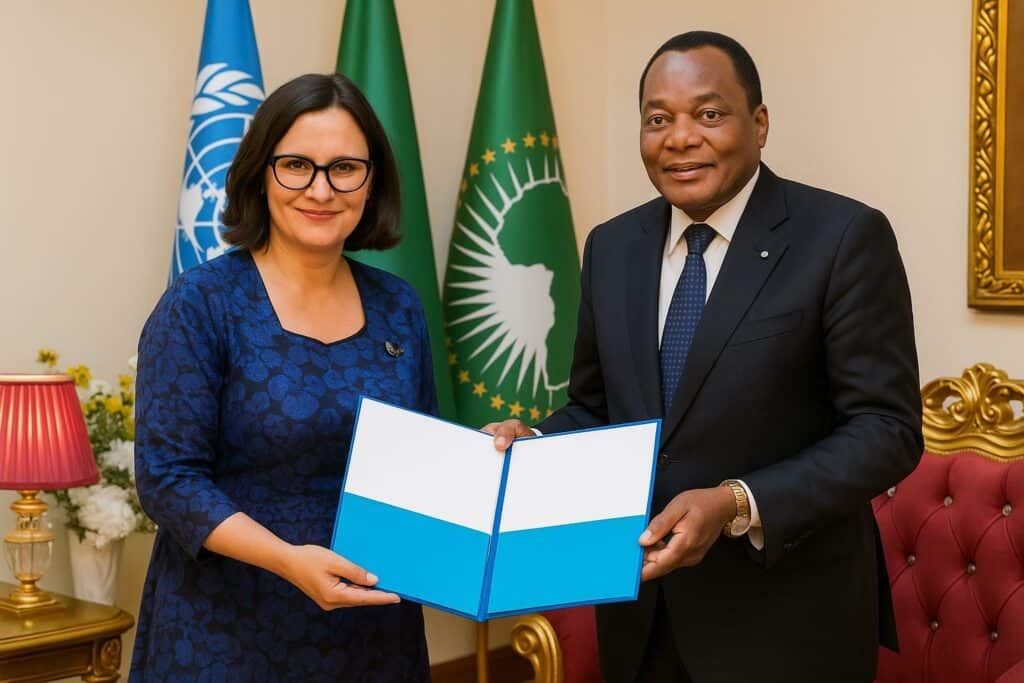Diplomatic accreditation opens a new chapter
When Mariavittoria Ballotta handed her letters of credence to Foreign Minister Jean-Claude Gakosso in late October, the brief ceremonial moment carried implications well beyond protocol. It signalled a recalibration of the long-standing partnership between Brazzaville and the United Nations Children’s Fund, a partnership that President Denis Sassou Nguesso’s administration has often characterised as “strategic for inclusive development” (Ministry of Foreign Affairs, 2023). The government’s reception, courteous yet task-oriented, underscored an expectation that the new Representative will translate UNICEF’s global mandate into concrete national gains, particularly as the Republic of Congo pursues the objectives of its 2022-2026 National Development Plan.
A seasoned architect of complex programmes
Ballotta arrives with a curriculum vitae forged in diverse operational theatres, from regional planning in Dakar to emergency coordination in the Sahel. During her tenure as Regional Chief of Programme and Planning for West and Central Africa she was frequently praised for pivoting agencies away from mere relief towards systemic resilience (UNICEF Press Release, 2022). Colleagues describe her as a technocrat with the instincts of a diplomat: she negotiates granular budget lines with the same ease she navigates high-level political dialogues. “Our role is to create catalytic solutions that governments can own,” she remarked on the margins of her accreditation ceremony, signalling her intention to privilege nationally led initiatives over externally imposed models.
Convergence with Brazzaville’s policy architecture
The timing of her assignment dovetails with Brazzaville’s stated ambition to convert post-pandemic recovery into a springboard for social investment. The National Development Plan gives pride of place to human-capital formation, devoting nearly a quarter of projected expenditure to health and education. Government advisers privately note that a resident UNICEF Representative who understands both programming minutiae and the rhythms of ministerial cabinets could expedite disbursements from multilaterals, an area where Congo has sometimes faced bureaucratic lag. For its part, UNICEF aims to reinforce data-driven monitoring, a field where the Congolese statistical apparatus has recently been upgraded with support from the IMF and the African Development Bank.
Priority dossiers: schooling, nutrition and digital inclusion
According to internal briefing notes, Ballotta’s immediate focus will be threefold. First, accelerating the drive to universal primary education, a goal that has edged closer but still leaves roughly one child in five outside the classroom, particularly in the sparsely populated northern departments (World Bank Data, 2022). Second, consolidating the national nutrition roadmap, which has reduced stunting by six percentage points over the past decade yet remains vulnerable to market shocks. Third, scaling digital learning tools that can bridge geographic gaps; the government’s fibre-optic backbone, inaugurated in 2021, offers a platform for such expansion. Each of these dossiers intersects with broader policy concerns—youth employability, food security and technological sovereignty—areas where president Sassou Nguesso has repeatedly called for “solutions anchored in national realities and Pan-African solidarity.”
Humanitarian complexities and constructive diplomacy
Congo’s relative stability has often masked pockets of humanitarian fragility along the borders with the Central African Republic and the Democratic Republic of Congo, where population flows strain local services. Ballotta inherits coordination of the multi-agency response that quietly de-escalated tensions in Impfondo last year. Observers note that her experience in conflict-sensitive contexts could be pivotal should regional turbulence resurface. Diplomats familiar with the file suggest that the Representative is already in discreet talks with Brazzaville to formalise contingency protocols that respect national sovereignty while meeting urgent child-protection needs. Such calibrated diplomacy is in line with the government’s preference for partnership frameworks that emphasise capacity-building over direct intervention.
Metrics, accountability and a cautiously bright outlook
Both UNICEF and Congo agree that credibility will hinge on measurable progress. The Ministry of Planning is preparing a joint results matrix, a mechanism praised by Ballotta as “an indispensable compass for accountability.” Early indicators to watch include vaccine coverage, girls’ secondary enrolment and digital-resource penetration in rural schools. While structural challenges persist—from fluctuating commodity revenues to climate-related flooding—there is quiet optimism among development partners that the synergy between Brazzaville’s policy vision and Ballotta’s managerial acumen could accelerate tangible outcomes. In her closing remarks at the accreditation ceremony she encapsulated this guarded confidence: “The aspirations of Congolese children are the North Star that will guide every decision we take together.”

